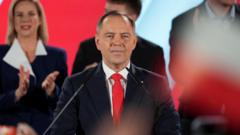**In a dramatic election, conservative historian Karol Nawrocki has won the Polish presidency, defeating liberal mayor Rafal Trzaskowski by a narrow margin after initial exit polls suggested a different outcome.**
**Karol Nawrocki Secures Polish Presidency in Narrow Vote Turnaround**

**Karol Nawrocki Secures Polish Presidency in Narrow Vote Turnaround**
**The newly elected president's victory highlights deep political divides as he prepares to lead Poland in a challenging political landscape.**
Karol Nawrocki, a historian aligned with right-wing perspectives, has emerged victorious in the Polish presidential election, securing 50.9% of the vote according to the state electoral commission (PKW). His opponent, Warsaw's liberal mayor Rafal Trzaskowski, garnered 49.1% after a tight contest characterized by fluctuating early results. The initial exit poll hinted at a victory for Trzaskowski, who claimed victory prematurely with 50.3% to Nawrocki's 49.7%. However, as the official results came in, Nawrocki's supporters celebrated a significant comeback.
Trzaskowski’s initial confidence was palpable, as he shared with supporters that the close results would enter the lexicon of Polish politics. Meanwhile, Nawrocki urged his followers to remain hopeful, hinting at a strong showing once all votes were counted.
As president, Nawrocki is expected to utilize his veto power to counteract the pro-European Union initiatives of Prime Minister Donald Tusk, echoing a theme of Polish sovereignty. The victory may invigorate his party, the national conservative Law and Justice (PiS), propelling renewed ambitions to regain parliamentary dominance in the 2027 elections.
Nawrocki's platform embraces traditional values, emphasizing Catholic and family ideals, while rightfully maintaining that Polish interests should prevail in international affairs. He has pledged support for Ukraine amidst the Russian aggression but remains resistant to expanding NATO and EU membership to the war-torn country.
While the Polish presidency is largely symbolic with limited foreign policy influence, Nawrocki's veto can significantly affect legislative processes, particularly as Tusk's coalition grapples without a solid parliamentary majority. The out-going president, Andrzej Duda, commended Nawrocki for his commendable campaign and perseverance.
The political landscape poses contrasts between the two candidates’ approaches towards EU relations. Trzaskowski backs Tusk's alignment with the broader European community, seeking collaboration with key partners like Germany and France, while Nawrocki reaffirms his commitment to a fiercely independent Poland, rejecting further ceding of powers to Brussels amidst challenges such as climate and migration policies.
Although relatively unknown on the national stage prior to his candidacy, Nawrocki's image was curated by PiS to resonate with citizens, blending a youthful vigor with a sportsman's physique. His allegiance to figures like Donald Trump and controversial past concerning property ownership have raised eyebrows during the campaign, yet his promise to aid a vulnerable citizen after facing adversity cemented his stance within the electorate.
With his inaugural term ahead, Karol Nawrocki's presidency marks a pivotal continuation of Poland's enduring political narrative, illustrating deep-seated divisions that will shape the nation's path forward.



















